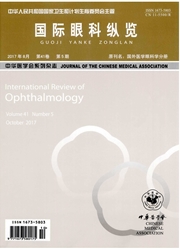

 中文摘要:
中文摘要:
视网膜母细胞瘤(RB)常伴有玻璃体腔种植.由于玻璃体内缺乏血液供应,化疗药物难以在玻璃体内达到有效浓度.尽管全身化疗及眼动脉介入化疗明显提高了RB的眼球保留率,但对于玻璃体腔内子瘤的控制仍不理想.近年来,玻璃体腔注药(IViT)治疗RB引起了很大的关注.玻璃体腔注射马法兰等抗肿瘤药物对于RB伴玻璃体腔种植具有良好的疗效,且副作用较小.掌握安全剂量以及优化操作技术流程,可以进一步降低并发症的风险.对于伴有顽固性或复发性玻璃体腔种植的RB患者,IViT提供了一个相对安全有效的保留眼球的途径,有望成为临床上治疗RB的一种重要手段.目前IViT的批准有待于二期临床试验的结果.本文就IViT治疗伴玻璃体腔种植RB的疗效、副作用以及如何提高治疗安全性等方面的研究进展进行综述.
 英文摘要:
英文摘要:
Vitreous seeding is common in retinoblastoma.As vitreous is lack of blood supply,chemotherapy drugs can hardly reach the effective concentration in the eye.Intravenous chemotherapy and ophthalmic arterial chemotherapy have improved the salvage of the globe in patients with retinoblastoma.However,persistent or recurrent viable vitreous seeds become one of the most challenging conditions for eyepreservation therapy.In recent years,intravitreal injection therapy (IViT) has attracted great attention.Intravitreal injection of melphalan or other anti-tumor drugs has demonstrated success in the treatment of vitreous seeds with less side effects.To further reduce the risk of intraocular toxicity,we should use drugs at safe doses and improve the injection technique.Although IViC appears to offer a comparatively safe and efficient salvage option to refractory and recurrent vitreous seeds,its validation awaits the results of a prospective phase Ⅱ clinical trial.In this review,we summarized the recent research progress in IViT for retinoblastoma with vitreous seeding in terms of its effectiveness,complications and safety improvement.
 同期刊论文项目
同期刊论文项目
 同项目期刊论文
同项目期刊论文
 期刊信息
期刊信息
